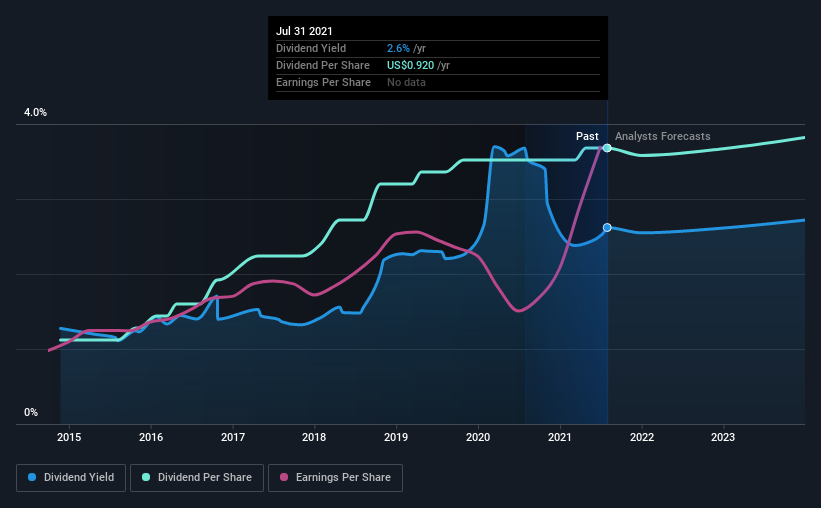Is It Smart To Buy Home Bancorp, Inc. (NASDAQ:HBCP) Before It Goes Ex-Dividend?
Readers hoping to buy Home Bancorp, Inc. (NASDAQ:HBCP) for its dividend will need to make their move shortly, as the stock is about to trade ex-dividend. The ex-dividend date occurs one day before the record date which is the day on which shareholders need to be on the company's books in order to receive a dividend. The ex-dividend date is an important date to be aware of as any purchase of the stock made on or after this date might mean a late settlement that doesn't show on the record date. Thus, you can purchase Home Bancorp's shares before the 6th of August in order to receive the dividend, which the company will pay on the 20th of August.
The company's next dividend payment will be US$0.23 per share. Last year, in total, the company distributed US$0.92 to shareholders. Last year's total dividend payments show that Home Bancorp has a trailing yield of 2.6% on the current share price of $35.12. Dividends are a major contributor to investment returns for long term holders, but only if the dividend continues to be paid. So we need to investigate whether Home Bancorp can afford its dividend, and if the dividend could grow.
View our latest analysis for Home Bancorp
Dividends are typically paid out of company income, so if a company pays out more than it earned, its dividend is usually at a higher risk of being cut. Home Bancorp has a low and conservative payout ratio of just 18% of its income after tax.
When a company paid out less in dividends than it earned in profit, this generally suggests its dividend is affordable. The lower the % of its profit that it pays out, the greater the margin of safety for the dividend if the business enters a downturn.
Click here to see the company's payout ratio, plus analyst estimates of its future dividends.
Have Earnings And Dividends Been Growing?
Businesses with strong growth prospects usually make the best dividend payers, because it's easier to grow dividends when earnings per share are improving. If business enters a downturn and the dividend is cut, the company could see its value fall precipitously. It's encouraging to see Home Bancorp has grown its earnings rapidly, up 22% a year for the past five years.
The main way most investors will assess a company's dividend prospects is by checking the historical rate of dividend growth. In the past seven years, Home Bancorp has increased its dividend at approximately 19% a year on average. It's great to see earnings per share growing rapidly over several years, and dividends per share growing right along with it.
Final Takeaway
Has Home Bancorp got what it takes to maintain its dividend payments? When companies are growing rapidly and retaining a majority of the profits within the business, it's usually a sign that reinvesting earnings creates more value than paying dividends to shareholders. This is one of the most attractive investment combinations under this analysis, as it can create substantial value for investors over the long run. Home Bancorp ticks a lot of boxes for us from a dividend perspective, and we think these characteristics should mark the company as deserving of further attention.
So while Home Bancorp looks good from a dividend perspective, it's always worthwhile being up to date with the risks involved in this stock. For instance, we've identified 2 warning signs for Home Bancorp (1 makes us a bit uncomfortable) you should be aware of.
We wouldn't recommend just buying the first dividend stock you see, though. Here's a list of interesting dividend stocks with a greater than 2% yield and an upcoming dividend.
This article by Simply Wall St is general in nature. It does not constitute a recommendation to buy or sell any stock, and does not take account of your objectives, or your financial situation. We aim to bring you long-term focused analysis driven by fundamental data. Note that our analysis may not factor in the latest price-sensitive company announcements or qualitative material. Simply Wall St has no position in any stocks mentioned.
Have feedback on this article? Concerned about the content? Get in touch with us directly. Alternatively, email editorial-team (at) simplywallst.com.
